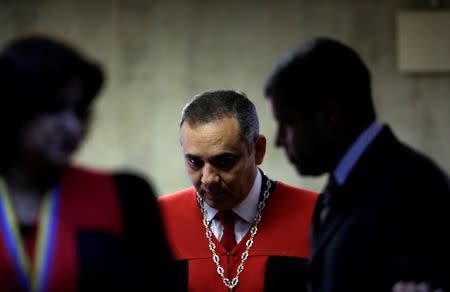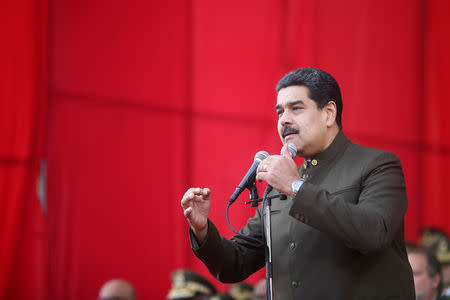EU set to hit top Venezuelan officials with sanctions - diplomats
By Robin Emmott
BRUSSELS (Reuters) - Seven senior Venezuelan officials are likely to face European Union sanctions from next week, including the country's powerful chief justice, diplomats said, as the EU seeks to pressure President Nicolas Maduro to resolve a political crisis.
The travel bans and asset freezes, which EU ambassadors are set to approve on Thursday, will follow U.S. sanctions last year and mark a tougher stance from European capitals that had sought to coax a solution without resorting to punitive measures.
"The (Venezuelan) government has crushed the opposition and is guilty of human rights abuses, so we believe it is time to send a strong message," an EU diplomat involved in discussions said.
Branded a dictatorship by France, the United States and its South American neighbours, Maduro's government is accused by many governments of dragging Venezuela towards authoritarianism and ruining the economy. The country has the world's largest proven oil reserves but suffers inflation and food shortages.
The European Union imposed an arms embargo in November.
Experts say U.S. sanctions, while providing strong symbolism, have had little or no impact on Maduro's policies so far and that oil-sector and financial sanctions may be the only way to force the Venezuelan government to change.
Oil and related products make up three quarters of Venezuela's exports to the EU, but there has been no discussion of imposing an oil embargo, diplomats said.
There was no immediate reaction from the Maduro government, although he has regularly accused the EU of joining forces with Washington to denigrate and topple socialist rule in Venezuela via false accusations and support for coup plotters.
MADURO'S ENFORCER
Two EU diplomats said those likely to be targeted with sanctions were senior officials in charge of security forces accused of widespread abuses, particularly during anti-government protests last year.
The list could still change, the diplomats said, but at present those likely to be hit with the travel bans and asset freezes include Antonio Jose Benavides Torres, chief of the Capital District in Caracas; Interior Minister Nestor Riverol; National Intelligence Director Gustavo Gonzalez Lopez; and Chief Justice Maikel Moreno, who heads the Supreme Court.
Moreno is seen as Maduro's legal enforcer. Last year his court gave the green light for Maduro to proceed with an election that created the Constituent Assembly, a legislature that now supersedes the opposition-led parliament and cemented Maduro's rule.
At least 125 people died in four months of protests that ensued after the court sought in March to neuter parliament.
However, unlike the United States and Canada, the EU does not intend to sanction Maduro himself, seeking instead to put pressure on those around him but allow the president the option to travel for any future talks.
If agreed by Brussels ambassadors from the 28 EU nations on Thursday, the sanctions would likely be adopted and imposed some time next week, diplomats said.
(Additional reporting by Andrew Cawthorne in Caracas; Editing by Peter Graff)

 Yahoo News
Yahoo News 



